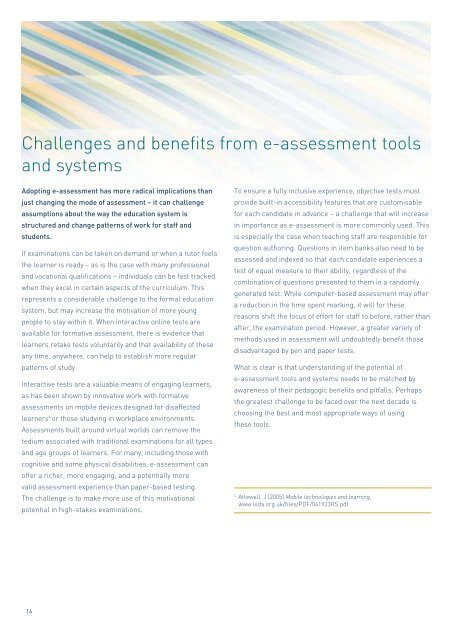Effective Practice with e-Assessment: An overview of ... - Jisc
Effective Practice with e-Assessment: An overview of ... - Jisc
Effective Practice with e-Assessment: An overview of ... - Jisc
You also want an ePaper? Increase the reach of your titles
YUMPU automatically turns print PDFs into web optimized ePapers that Google loves.
Challenges and benefits from e-assessment tools<br />
and systems<br />
Adopting e-assessment has more radical implications than<br />
just changing the mode <strong>of</strong> assessment – it can challenge<br />
assumptions about the way the education system is<br />
structured and change patterns <strong>of</strong> work for staff and<br />
students.<br />
If examinations can be taken on demand or when a tutor feels<br />
the learner is ready – as is the case <strong>with</strong> many pr<strong>of</strong>essional<br />
and vocational qualifications – individuals can be fast tracked<br />
when they excel in certain aspects <strong>of</strong> the curriculum. This<br />
represents a considerable challenge to the formal education<br />
system, but may increase the motivation <strong>of</strong> more young<br />
people to stay <strong>with</strong>in it. When interactive online tests are<br />
available for formative assessment, there is evidence that<br />
learners retake tests voluntarily and that availability <strong>of</strong> these<br />
any time, anywhere, can help to establish more regular<br />
patterns <strong>of</strong> study.<br />
Interactive tests are a valuable means <strong>of</strong> engaging learners,<br />
as has been shown by innovative work <strong>with</strong> formative<br />
assessments on mobile devices designed for disaffected<br />
learners 4 or those studying in workplace environments.<br />
<strong>Assessment</strong>s built around virtual worlds can remove the<br />
tedium associated <strong>with</strong> traditional examinations for all types<br />
and age groups <strong>of</strong> learners. For many, including those <strong>with</strong><br />
cognitive and some physical disabilities, e-assessment can<br />
<strong>of</strong>fer a richer, more engaging, and a potentially more<br />
valid assessment experience than paper-based testing.<br />
The challenge is to make more use <strong>of</strong> this motivational<br />
potential in high-stakes examinations.<br />
To ensure a fully inclusive experience, objective tests must<br />
provide built-in accessibility features that are customisable<br />
for each candidate in advance – a challenge that will increase<br />
in importance as e-assessment is more commonly used. This<br />
is especially the case when teaching staff are responsible for<br />
question authoring. Questions in item banks also need to be<br />
assessed and indexed so that each candidate experiences a<br />
test <strong>of</strong> equal measure to their ability, regardless <strong>of</strong> the<br />
combination <strong>of</strong> questions presented to them in a randomly<br />
generated test. While computer-based assessment may <strong>of</strong>fer<br />
a reduction in the time spent marking, it will for these<br />
reasons shift the focus <strong>of</strong> effort for staff to before, rather than<br />
after, the examination period. However, a greater variety <strong>of</strong><br />
methods used in assessment will undoubtedly benefit those<br />
disadvantaged by pen and paper tests.<br />
What is clear is that understanding <strong>of</strong> the potential <strong>of</strong><br />
e-assessment tools and systems needs to be matched by<br />
awareness <strong>of</strong> their pedagogic benefits and pitfalls. Perhaps<br />
the greatest challenge to be faced over the next decade is<br />
choosing the best and most appropriate ways <strong>of</strong> using<br />
these tools.<br />
4<br />
Attewell, J (2005) Mobile technologies and learning,<br />
www.lsda.org.uk/files/PDF/041923RS.pdf<br />
16
















